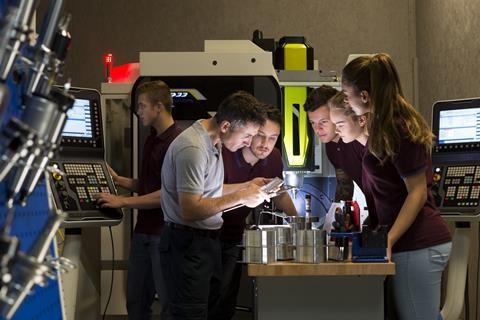Work experience
Where can I get chemistry-related work experience?
It can be hard to get chemistry-related work experience, especially in labs but companies and universities really like students who have the enthusiasm and drive to hunt for a relevant position. Below are some ideas to support your search:
Download our guide to work experience.
-
Guide to work experience
pdf, size 271 kb
- Speak to your careers adviser, chemistry or science teacher about local companies that might offer work experience. Your school may also have a work experience programme. Attending your school careers fairs or employer talks will help you learn about jobs that you might be interested in, or to find out if they offer work experience.
- Look for employers of chemists in your area. Ask if they might have work experience in some of the other business functions within the company. This is a good way to learn more about the uses and applications of chemistry without having to be fully trained to be safe in a laboratory. Contacting general science employers or research institutes, companies on local science parks as well as small and medium enterprises (SMEs) can be useful. SMEs are often more flexible. Be aware that they are more likely to be able to help if you ask them well in advance of when you need to do your placement. You can also follow these companies on social media to find out what they can offer, or ask your family or relatives about how they may be able to help you. T
- Your local hospital is worth approaching for work experience in their research departments, or pathology labs that use a lot of techniques involving chemistry.
- You can also contact your local University’s chemistry department, or schools liaison and outreach team to find out if they can help.
You should keep in mind that it is likely you will not be doing any vital or important tasks during your work experience. Work experience is a great learning experience, and your efforts and interest will not go unnoticed by potential employers and referees for your CV. It is also a good idea to maintain contact with the people you’ve met even after you leave. This can be via email, phone or social media. They may have future job vacancies or be able to help you in some other way.
Whilst the majority of employers will follow employment law, it’s important to be aware of your own rights when it comes to work experience, placements or internships.
The Royal Society of Chemistry does not provide work experience or shadowing opportunities. However, your nearest Royal Society of Chemistry Local Section (of which there are 35 throughout the UK and Republic of Ireland) may be able to offer advice on how to find placements in your area.
Virtual work experience
Below are a few places where you can access virtual work experiences. Also doing a regular internet search for ‘virtual work experience’ will also help discover new schemes as they become established:
- IChemE Virtual Work Experience programme - Aimed at students aged 13+ years, and particularly 14 to 18 years, explore different industries and different routes (apprenticeship and university) into chemical and process engineering
- Barclays life skills - learn new workplace skills
- Springpod - apply for virtual work experience and university course taster experiences
- Rate my placement offers a free, flexible programme to upskill individuals in workplace skills and behaviours
- Speakers for schools - free work experience programme
- Forage - runs virtual work experience programmes with big and small companies that mimics entry-level work. Once enrolled, students are given a hypothetical set of tasks that an employee would expect to complete on a given work day teaching students real skills professionals use daily and connects them to the firms themselves.
- Founder4Schools - free interactive webinars so students can still hear from and interact with the business community
Work shadowing
It is sometimes easier to ask for work shadowing opportunities, rather than hands-on work experience. Work shadowing is usually a shorter experience where someone shows you what they do rather than you doing the work. This is still a good opportunity as it allows you to experience the workplace and ask questions about what their day is like, who they work with and why they enjoy their job. Even if a company are not able to offer work experience, you can still ask if you can speak with someone outside of the lab so they can answer your questions.

Source: SolStock / E+ / Getty Images
Alternatives
If you aren’t able to find a suitable chemistry-related work experience, placement or shadowing there are alternatives such as volunteering or other science related work that can still provide practical skills and allow you to explore other futures. Consider volunteering at your local science festival or science centre to see what they offer. The British Science Association offer a variety of roles for volunteers as well as one week’s work experience at their offices for low-income individuals. If you’re interested in science communication then volunteering and work experience is very important. The social mobility fund (SMF) aims to support young people from low-income backgrounds through specific advice, guidance and by arranging paid internships with companies like EDF Energy and Rolls Royce.
Additional links
- Chemistry World Jobs internships board
- Change 100 interships for students and graduates with disabilities or long-term conditions
- UKSpa - list of science parks around the UK
- Try contacting your local Education Business Partnership.
- The Nuffield Foundation offer research placements to over 1,100 students
- The CREST Awards scheme gives students the chance to participate in hands-on science to solve real-life STEM challenges.
- Year in Industry is the UK’s leading student placement experts who offer one year placements before starting university.
- UK Bioindustry Associations - list of organisations in the UK bioindustry
- Step into the NHS or finding work experience in the NHS (teacher and advisor’s guide)
- Bright Green Placements - offers opportunities to students and graduates to work with organisations across Scotland
- Chemagility - worldwide directory of chemical distribution companies
- Help is available from Smart Futures and Careersportal (Republic of Ireland).
- The British Antarctic Survey work experience opportunities
Volunteering
- Do-it (UK-wide)
- Volunteer Scotland
- Volunteering Wales
- Volunteer Now (Northern Ireland)
- Volunteer Ireland (Republic of Ireland)
Chemical sciences' employers
Use our employers map to find opportunities on your doorstep.
LATEST JOB PROFILES
Laboratory technician, steelmaking
Jamie’s cutting carbon in the first step of steelmaking: iron ore pellets
Commercial director, chemical manufacturing
Mike is helping industries make chemicals in a cleaner, faster way
Director of chemistry, biotechnology
David is driving the discovery and development of new medicines at a new biotechnology company
Technical director, catalytic design
David designs and makes catalysts that are helping to develop sustainable aviation fuels












